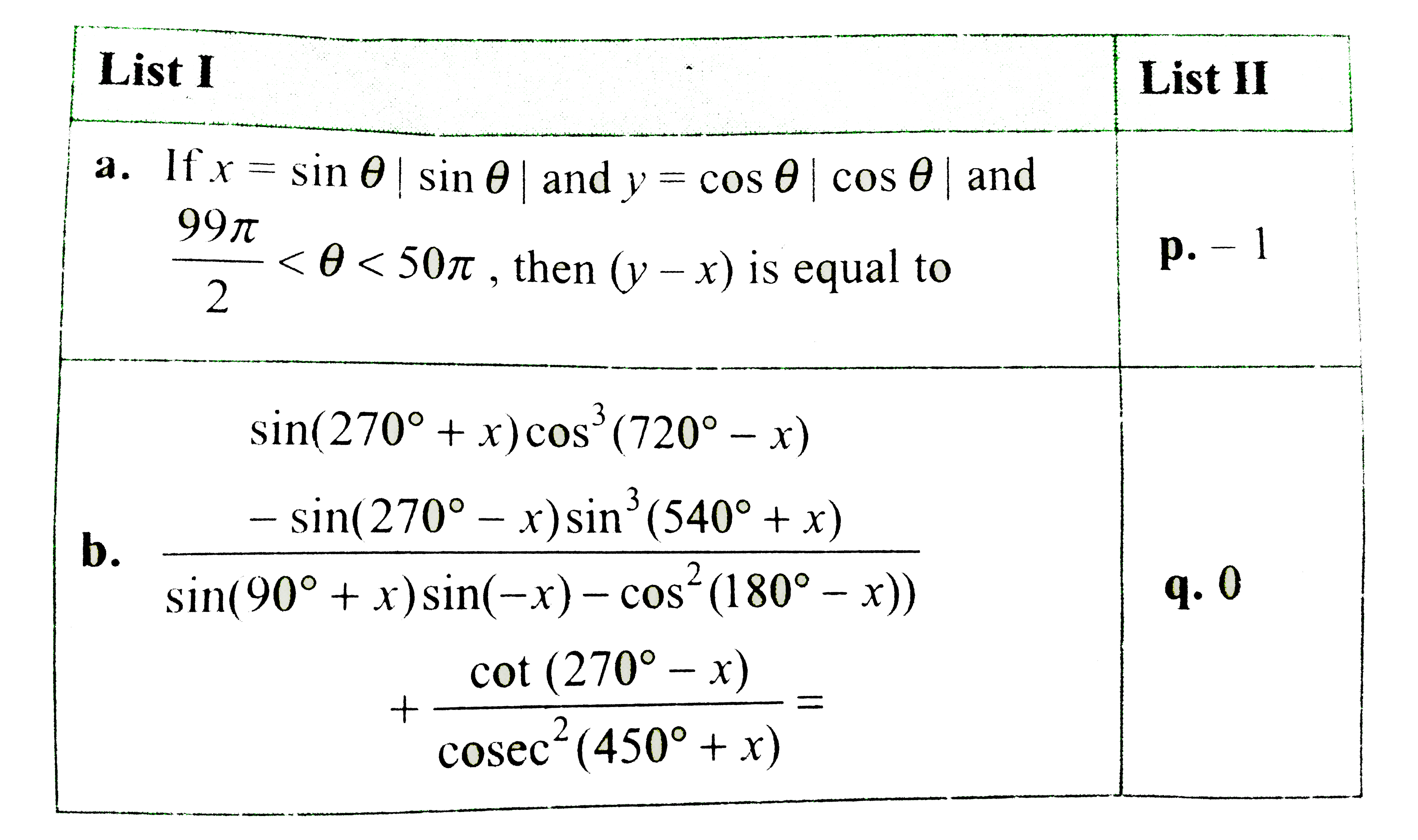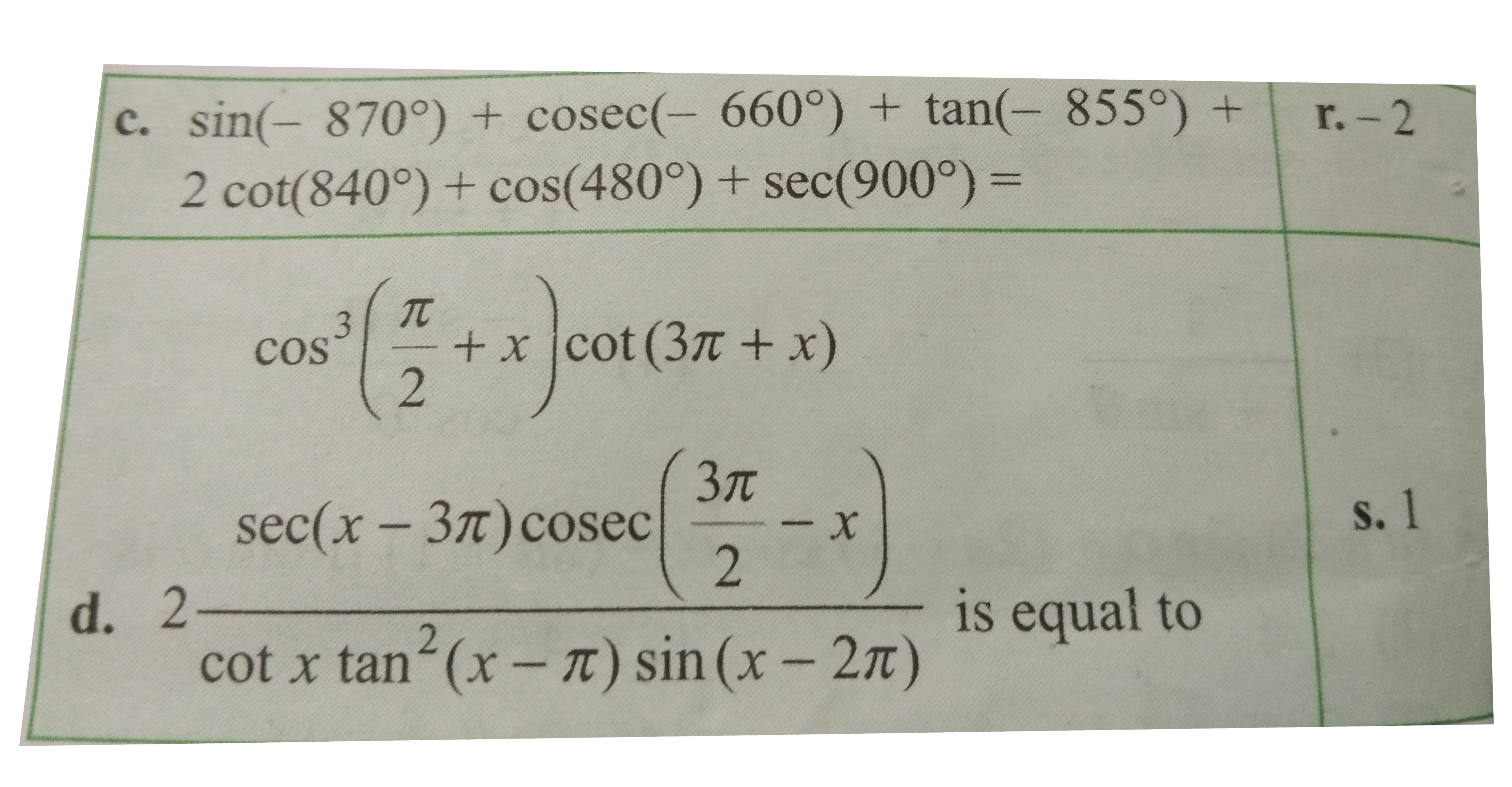If cosα=12(x+1x)andcosβ=12(y+1y),(xy>0);x,y,α,β∈R then sin(α+β+γ+sinγ∀γ∈R cosαcosβ=1∀α,β∈R (cosα+cosβ)2=4∀α,β∈R sin(α+β+γ)=sinα+sinβ+s∈γ∀a,b,γ∈RSolution in Tamil
sin(α+β+γ)=sinγ∀γ∈R
cosαcosβ=1∀α,β∈R
(cosα+cosβ)2=4∀α,β∈R
sin(α+β+γ)=sinα+sinβ+sinγ∀a,b,γ∈R
The correct Answer is:A, B, C, D
cosα=12(x+1x)andcosβ=12(y+1y)
since xy>0,we have
x+12≥2or≤−2andy+1y≥2or≤−2
⇒cosα=1,cosβ=1
orcosα=−1,cosβ=−1
∴cosαcosβ=1
⇒α+β is an even multiple of π
(cosα+cosβ)2=4
⇒sin(α+β+γ)=sin(2nπ+γ)=sinγ
Also, sinα=sinβ=0
Topper's Solved these Questions
- TRIGONOMETRIC FUNCTIONS BOOK - CENGAGECHAPTER - TRIGONOMETRIC FUNCTIONS EXERCISE - Exercise (Comprehension)
11 Videos
- TRIGONOMETRIC FUNCTIONS BOOK - CENGAGECHAPTER - TRIGONOMETRIC FUNCTIONS EXERCISE - Exercise (Matrix)
3 Videos
- TRIGONOMETRIC FUNCTIONS BOOK - CENGAGECHAPTER - TRIGONOMETRIC FUNCTIONS EXERCISE - Exercise (Single)
57 Videos
- TRIGONOMETRIC EQUATIONSBOOK - CENGAGECHAPTER - TRIGONOMETRIC EQUATIONSEXERCISE - Archives (Matrix Match Type)
1 Video
- TRIGONOMETRIC RATIOS AND TRANSFORMATION FORMULASBOOK - CENGAGECHAPTER - TRIGONOMETRIC RATIOS AND TRANSFORMATION FORMULASEXERCISE - Matrix Match Type
1 Video
Similar Questions
Let us consider the equation cos4xa+sin4xb=1a+b,x∈[0,π2],a,b>0
The value of sin2x in terms of a and b is
View Solution

View SolutionIf 5tanθ=4, then 5sinθ−3cosθ5sinθ+2cosθ is equal to 0 (b) 1 (c) 16 (d) 6
View SolutionFind the derivative of y=tan−12x3
View SolutionRefer to the following diagram :

Column IColumn IIa.Collinear vectorsp.→ab.Coinitial vectorsq.→bc.Equal vectorsr.→cd.Unlike vectors (same initial point)s.→d
View SolutionIf cosα=12(x+1x)andcosβ=12(y+1y),(xy>0);x,y,α,β∈R then sin(α+β+γ+sinγ∀γ∈R cosαcosβ=1∀α,β∈R (cosα+cosβ)2=4∀α,β∈R sin(α+β+γ)=sinα+sinβ+s∈γ∀a,b,γ∈R
View SolutionIf y=1/(1+x^(beta-alpha)+x^(gamma-alpha))+1/(1+x^(alpha-beta)+x^(gamma-beta))+1/(1+x^(alpha-gamma)+x^(beta-gamma)), then (dy)/(dx) is equal to-
View SolutionIf ,cos(x+alpha)cos(x+beta),cos(x+gamma)sin(x+alpha),sin(x+beta),sin(x+gamma)sin(beta-gamma),sin(gamma-alpha),sin(alpha-beta) and f(0)=-2, then ,sum_(r=1)^(30)|f(r)| equals
View SolutionIf alpha,beta,gamma are the roots of the equation x^(3)+px^(2)+qx+r=0, then the value of (alpha-(1)/(beta gamma))(beta-(1)/(gamma alpha))(gamma-(1)/(alpha beta)) is
View SolutionIf ,cos(x+alpha)cos(x+beta),cos(x+gamma)sin(x+alpha),sin(x+beta),sin(x+gamma)sin(beta-gamma),sin(gamma-alpha),sin(alpha-beta) and f(2),=6, then find (1)/(5)sum_(r=1)^(25)f(r)
View SolutionProve that: ∣∣ ∣ ∣∣sinαcosα1sinβcosβ1sinγcosγ1∣∣ ∣ ∣∣=sin(α−β)+sin(β−γ)+sin(γ−α)
View SolutionIf α,β,γ are the zeros of the polynomial x3−px2+qx−r then 1αβ+1βγ+1γα = …………..
View SolutionIf x=rcosαcosβcosγ,y=cosαcosβsinγ,z=rsinαcosβ,μ=rsinβ then x2+y2+z2+μ2=
View SolutionIf α,β,γ are roots of x3−px2+qx−r=0 then (α+β)−1+(β+γ)−1+(γ+α)−1 =
View SolutionIf α,β,γ are the roots of x3+3px2+3px+r=0 then the equation whose roots are α−1βγ,β−1γα,γ−1αβ is
View SolutionIf f(x)=∣∣ ∣ ∣∣cos(x+α)cos(x+β)cos(x+γ)sin(x+α)sin(x+β)sin(x+γ)sin(β−γ)sin(γ−α)sin(α−β)∣∣ ∣ ∣∣andf(2)=5the20∑r=1f(r) is equal to
View Solution
